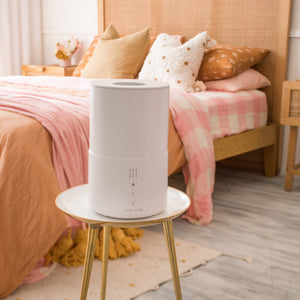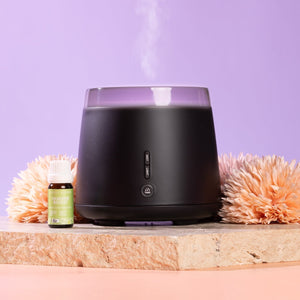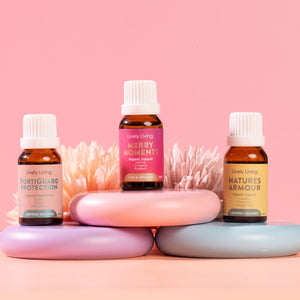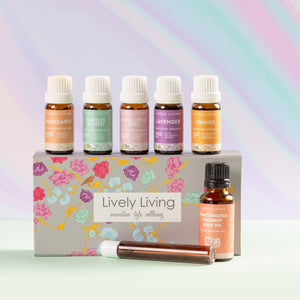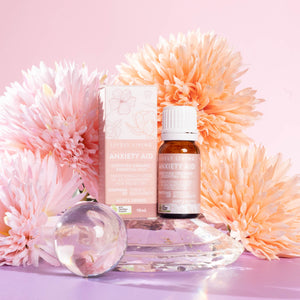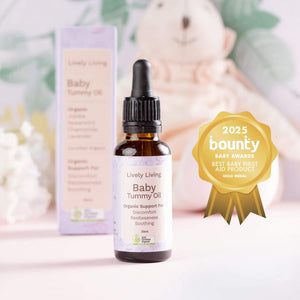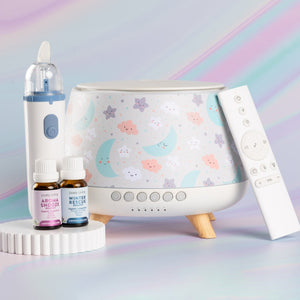Essential Oil Ingestion: Safety Tips and Risks
You hear a lot about essential oils these days. They smell amazing in diffusers and can feel great in massages. But what about taking them internally?
The topic of essential oil ingestion is a really hot one, with lots of different opinions flying around. Maybe you've seen someone put a drop of lemon oil in their water or heard claims about swallowing oils for health benefits.
It sounds intriguing, right? Still, there's a lot of confusion and concern surrounding essential oil ingestion, and for good reason. You'll learn about the safety, risks, and misunderstandings concerning swallowing these powerful plant extracts, helping you make informed choices.
Table of Contents:
- What Exactly Are Essential Oils?
- The Million-Dollar Question: Is Essential Oil Ingestion Safe?
- Why Taking Essential Oils Internally Carries Significant Risks
- What To Do In Case of Essential Oil Ingestion
- Decoding Labels: 'Therapeutic Grade' and 'Food Grade'
- When Might Internal Use Ever Be Okay? (Hint: Rarely for Home Use)
- Safer Alternatives to Experience Essential Oil Benefits
- Always Seek Guidance from Qualified Professionals
- Beware of Misleading Information
- Conclusion
What Exactly Are Essential Oils?
First off, it's important to understand what essential oils truly are. They aren't like the fatty oils you cook with, such as olive or coconut oil, often called a carrier oil. Essential oils are highly concentrated compounds extracted from plants.
These compounds capture the plant's scent and flavor, often called its 'essence.' It takes a huge amount of plant material – sometimes hundreds of pounds – to make just one small bottle of essential oil.
This means they are incredibly potent substances. Think about peppermint oil; one single drop can be as strong as drinking over 20 cups of peppermint tea. That concentration is why they smell so strong and why they have effects on the body, but it's also why using them improperly, especially internally, can be dangerous.
The Million-Dollar Question: Is Essential Oil Ingestion Safe?
So, can you actually swallow essential oils? The short answer is: generally, no, not without extreme caution and expert guidance. While some companies might suggest adding oils to water or capsules, most certified aromatherapists and healthcare professionals strongly advise against it for the average person.
Why the conflicting advice? Some of it comes down to marketing, as companies selling oils benefit from promoting more uses. But independent organizations focused on safety, like the National Association for Holistic Aromatherapy (NAHA) and the Alliance of International Aromatherapists (AIA), consistently warn about the risks of casual ingestion.
Essential oils are powerful biochemical substances. Swallowing them means introducing these potent chemicals directly into your digestive system where they can be rapidly absorbed into the bloodstream. This isn't something to be done lightly or based on a friend's suggestion; potential toxicity essential oil use carries must be considered.

Why Taking Essential Oils Internally Carries Significant Risks
Let's get specific about the dangers. Ingesting essential oils isn't like adding a sprinkle of dried herbs to your food. The concentration makes a world of difference, leading to several potential problems including oil poisoning.
Irritation and Burns to Internal Tissues
Essential oils can be harsh on sensitive tissues. Think about how potent peppermint or clove oil feels even on your skin if undiluted, potentially causing skin irritation or contact dermatitis. Now imagine that direct contact happening inside your body.
Swallowing oils, especially undiluted or improperly diluted, can irritate or even burn the delicate mucous membrane lining your mouth, throat, esophagus, and stomach. This membrane irritation can cause significant pain, inflammation, ulcers, and long-term damage to your digestive tract. This highlights a major toxicity essential oils possess internally.
Even adding oils to water doesn't truly dilute them, as oil and water don't mix. The drops can float on top or cling to the sides of the glass, leading to concentrated contact when you drink, causing potential harm to the mucous membrane.
Potential for Toxicity and Poisoning
Because essential oils are so concentrated, it's surprisingly easy to take a toxic dose. Your liver and kidneys process substances entering your body. Overloading them with concentrated essential oil constituents can lead to serious organ damage or systemic toxicity; toxicity include risks to multiple organ systems.
Symptoms of essential oil poisoning can range widely, from nausea, vomiting, and abdominal pain to more severe effects like confusion, dizziness, CNS depression (central nervous system depression), seizures, loss of consciousness, and even death in cases of large ingestions. Some oils, like eucalyptus oil, are notorious for causing rapid onset of symptoms. Complications such as aspiration pneumonitis (lung inflammation caused by inhaling vomit or the oil itself) can also occur, potentially leading to secondary bacterial infection requiring prophylactic antibiotics, though their use is carefully considered based on objective evidence.
Children are particularly vulnerable due to their smaller body size, lower weight, and developing organs, making accidental poisoning a serious concern. Even small ingestions considered harmless in adults can cause significant poisoning in a child. Always treat essential oils as a potentially hazardous household product and store them safely out of reach.
Interactions with Medications
Essential oils contain active chemical components that can interfere with how your body processes medications. This could make your prescription drugs less effective or increase the risk of side effects. For example, oils like wintergreen or birch (high in methyl salicylate) can have blood-thinning effects similar to aspirin.
Taking certain oils internally could interact dangerously with blood thinners, diabetes medications, antidepressants, or other drugs. This is a risk many people don't consider, especially if they have an underlying medical condition. Always talk to your doctor, pharmacist, or another qualified healthcare professional before ingesting essential oils if you take any medication or have any underlying medical issues.
Risk of Sensitization
You might not have a bad reaction the first time you swallow an oil, but that doesn't mean it's safe. Repeated internal exposure can lead to sensitization. This means your body develops an allergic-type reaction over time.
Once sensitized, you might react negatively not just to ingesting the oil but also to smelling it or applying it to your skin, potentially developing contact dermatitis. This reaction can be permanent. It's a gradual process that highlights why long-term internal use without expert oversight is unwise.
Specific Oils That Are Especially Dangerous to Ingest
While casual ingestion of any essential oil is generally discouraged, some oils are known to be particularly hazardous when swallowed. These should absolutely be avoided internally unless under the strict supervision of a healthcare professional specifically trained in aromatic medicine (which is rare). Proper understanding of oil clinical toxicity is vital.
Examples of high-risk oils include:
- Wintergreen (Gaultheria procumbens) and Birch (Betula lenta): Contain high levels of methyl salicylate, similar to aspirin. Ingestion can cause salicylate toxicity (aspirin poisoning).
- Pennyroyal (Mentha pulegium): Known to be highly toxic to the liver and nervous system. Pennyroyal oil has been associated with severe poisoning events and should never be ingested.
- Sage (Salvia officinalis, certain chemotypes): Contains thujone, which can be neurotoxic (toxic to the nervous system) in certain doses.
- Eucalyptus (Eucalyptus species): Eucalyptus oil ingestion, especially eucalyptus oil poisoning in children, can rapidly cause CNS depression, seizures, breathing difficulties, and vomiting. Even small amounts can be dangerous for young children based on their developmental age.
- Camphor (Cinnamomum camphora): Highly toxic if swallowed, affecting the nervous system and potentially causing seizures.
- Clove oil (Syzygium aromaticum): Can cause mucous membrane irritation, liver damage, seizures, and blood clotting issues if ingested in sufficient quantities.
- Tea Tree (Melaleuca alternifolia): While commonly used topically (diluted), ingestion can cause drowsiness, confusion, unsteadiness, rash, and coma.
This list isn't exhaustive, and toxicity essential oil profiles vary. Researching the specific safety data for any essential oil you consider using internally is vital. Consulting resources like the Tisserand Institute or poison control information can provide detailed safety profiles.
Here's a table summarizing the risks of some commonly misused oils:
| Essential Oil | Primary Ingestion Risks |
|---|---|
| Eucalyptus Oil | CNS depression, seizures, aspiration pneumonitis (especially in children). |
| Pennyroyal Oil | Severe liver toxicity, neurotoxicity, potentially fatal. |
| Wintergreen / Birch | Salicylate (aspirin) poisoning, bleeding risk. |
| Camphor | Neurotoxicity, seizures. |
| Clove Oil | Mucous membrane irritation, liver toxicity, seizures, blood clotting issues. |
| Tea Tree Oil | Drowsiness, confusion, ataxia (unsteadiness), coma. |
| Sage (Thujone-rich) | Neurotoxicity, seizures. |
What To Do In Case of Essential Oil Ingestion
Accidental poisoning by essential oils, especially among children exploring their environment, is a significant risk. Intentional overdose or deliberate self-poisoning incidents also occur. Knowing the correct steps to take immediately is crucial.
If you suspect someone has swallowed an essential oil, do not try to induce vomiting, as this can increase the risk of aspiration pneumonitis. Call your local poison control center or poisons centre immediately;
Have the essential oil bottle with you when you call, if possible. Be ready to provide information like the specific type of essential oil, the estimated amount ingested, the person's age and weight, and any symptoms they are experiencing (like drowsiness, confusion, vomiting, abdominal pain, or eye symptoms). Follow the poison control expert's instructions exactly; these are key poisoning guidelines.
Depending on the oil, the amount ingested, and the patient's symptoms, they may advise monitoring at home or heading immediately to the nearest emergency department or children's hospital. Even small ingestions of certain oils like eucalyptus oil or camphor warrant immediate medical evaluation. Non-accidental poisoning should also be considered in certain situations, following standard procedures for safeguarding.
In a hospital setting, medical staff will assess the patient, checking vital signs including breathing rate, heart rate, blood pressure, and oxygen saturation. They will check for medicalert bracelet information. Depending on the severity and the specific toxicity essential oil profile, interventions may range from observation to more intensive care.
Decoding Labels: 'Therapeutic Grade' and 'Food Grade'
You might see bottles labeled 'Therapeutic Grade,' 'Certified Pure Therapeutic Grade,' or even 'Food Grade.' This language can suggest they are safe to swallow. But these terms can be very misleading.
There is no official, independent regulatory body in most countries (including the U.S. and Australia) that grades or certifies essential oils as 'therapeutic.' Often, these are simply marketing trademarks used by specific companies. They don't guarantee safety or effectiveness for internal use by the general public.
Similarly, 'Food Grade' or GRAS (Generally Recognized As Safe) status by the FDA usually applies to tiny amounts used for flavoring commercially produced food. It doesn't mean drinking drops of the same oil or a capsule is safe. The dose and method of exposure matter enormously when considering potential oil poisoning.
When Might Internal Use Ever Be Okay?
Are there absolutely zero situations where essential oils are taken internally? Not quite, but the legitimate instances are very specific and typically don't apply to casual home use. These situations usually fall under strict clinical practice guidelines.
In some countries, particularly France, medical doctors with specialized training in aromatherapy (aromatic medicine) might prescribe essential oils for internal use for specific medical conditions. This is done with precise dosages, often in specific formulations like coated capsules, and under strict medical supervision. It's not like grabbing a bottle off the shelf and self-treating.
The food industry uses tiny, precisely measured amounts of certain essential oils as flavorings. Again, this is done according to strict safety regulations and involves quantities far smaller than adding drops to your drink. A tiny trace of lemon oil flavoring in a beverage is vastly different from dropping undiluted essential oil into your water bottle.
For the average person exploring essential oils for wellness, these exceptions aren't relevant. The risks associated with self-prescribing essential oil ingestion, including potential toxicity, almost always outweigh any potential, often unproven, benefits.
Safer Alternatives to Experience Essential Oil Benefits
The good news is you don't need to swallow essential oils to enjoy their potential benefits. Aromatherapy offers much safer ways to incorporate these plant essences into your life for things like supporting mental health or relaxation.
Aromatic Use: Breathe It In
Inhaling essential oils is one of the main ways they affect mood. This happens when aromatic molecules travel through your nose to your olfactory system and interact with the limbic system in your brain, which is linked to emotion, memory, and aspects of mental health.
Using an ultrasonic diffuser is a popular method. You can also simply place a drop or two on a cotton ball or tissue and inhale, or add a few drops to a bowl of warm water (carefully, keeping your face back) for steam inhalation.
This allows you to experience the scent and potential mood effects without the risks of internal use like membrane irritation or systemic toxicity. Some people even find diffusing oils like lavender or chamomile helpful for stress reduction.
Topical Use: Apply to the Skin (Diluted.)
Applying essential oils to the skin allows them to be absorbed into the bloodstream, but much more slowly and gently than ingestion. The absolute necessity here is proper dilution. Never apply undiluted essential oils directly to your skin, as this can cause significant skin irritation, chemical burns, or painful contact dermatitis.
Always mix essential oils with a carrier oil – like coconut, jojoba, almond, or grapeseed oil – before applying them. A carrier oil helps spread the essential oil over a larger area and reduces the concentration applied directly to the skin cells. A common guideline for adults is a 1-2% dilution, which means about 6-12 drops of essential oil per ounce (30ml) of carrier oil; lower dilutions are needed for children or those with sensitive skin.
Always do a patch test on a small area of skin first to check for sensitivity before applying more widely. Topical application is great for localized relief (like muscle rubs using peppermint or ginger oil diluted in a carrier oil) or for gentle absorption during massage, avoiding the dangers linked to essential oil ingestion.
Always Seek Guidance from Qualified Professionals
If you're considering any use of essential oils beyond simple diffusion, especially anything involving internal use or topical application for specific health concerns, please talk to an expert first. Discussing your situation with a healthcare professional is especially important if you have any underlying medical condition. But who qualifies as an expert?
Look for a certified or registered aromatherapist who has completed extensive training from a recognized school. These professionals understand oil chemistry, safety protocols like dilution, contraindications, and appropriate application methods. They are typically independent and not just representatives selling a specific brand, offering objective advice.
Your doctor or pharmacist is also crucial, especially regarding potential drug interactions or if you have underlying medical conditions that could be affected. While many doctors may not have deep knowledge of aromatherapy, they are essential for discussing your overall health picture, reviewing your medical history, and advising on potential risks based on your specific health status or medications.
Beware of Misleading Information
The internet and social media are full of claims about essential oil ingestion. Be very critical of anecdotal stories ('my friend cured her cold by swallowing oregano oil.') or advice from people whose primary goal is to sell you oils. Personal testimonials are not a substitute for scientific evidence and established safety data like poisoning – acute guidelines.
Claims that internal use is necessary to get the 'full benefits' or that only certain brands are 'pure enough' to ingest are often marketing tactics rather than safety-based advice. High-quality oils are important for all uses, but quality doesn't automatically equal safety for essential oil ingestion. Even pure oils can cause oil poisoning if ingested improperly.
Prioritize information from unbiased sources like professional aromatherapy organizations, scientific studies (when available), poisons centre databases, and qualified healthcare practitioners. Your health and safety are worth more than trying something risky based on hearsay or sales pitches, especially concerning potent substances that can act as contact poisons internally.
Conclusion
So, thinking back on the question of essential oil ingestion, what's the main takeaway? For most people, most of the time, swallowing essential oils is generally not recommended due to significant safety concerns including the risk of oil poisoning. The potential problems, including internal mucous membrane irritation, toxicity leading to symptoms like CNS depression or abdominal pain, drug interactions, and sensitization, often outweigh the largely unproven benefits for casual home use.
While you might hear conflicting advice, especially from those selling essential oils, established aromatherapy safety guidelines from independent bodies strongly caution against routine essential oil ingestion. Accidental poisoning is a real danger, particularly for children, requiring immediate contact with poison control. Safer, effective ways to enjoy essential oils include diffusing them for aromatic benefits possibly linked to mental health, or applying them topically but only when properly diluted in a carrier oil to avoid skin irritation or contact dermatitis.
If you have questions about using essential oils for specific health purposes, or if you have an underlying medical condition, always consult a qualified aromatherapist or your trusted healthcare professional before trying something potentially harmful like essential oil ingestion. Making safe choices allows you to explore the world of aromatherapy responsibly.










